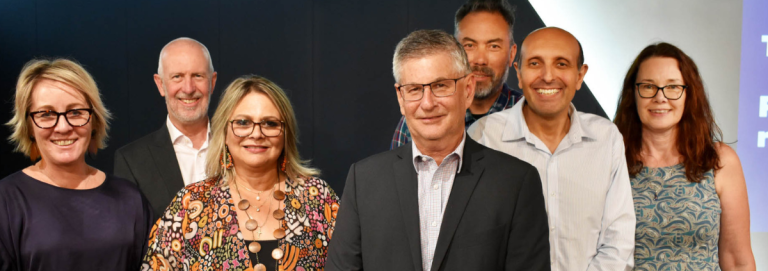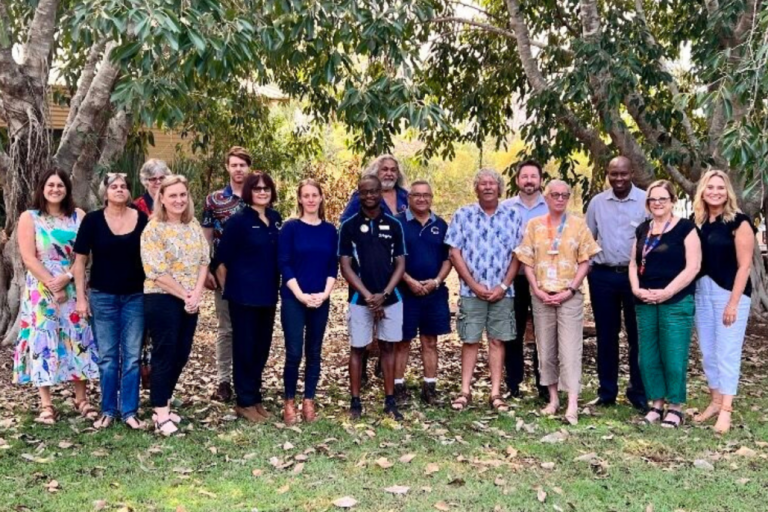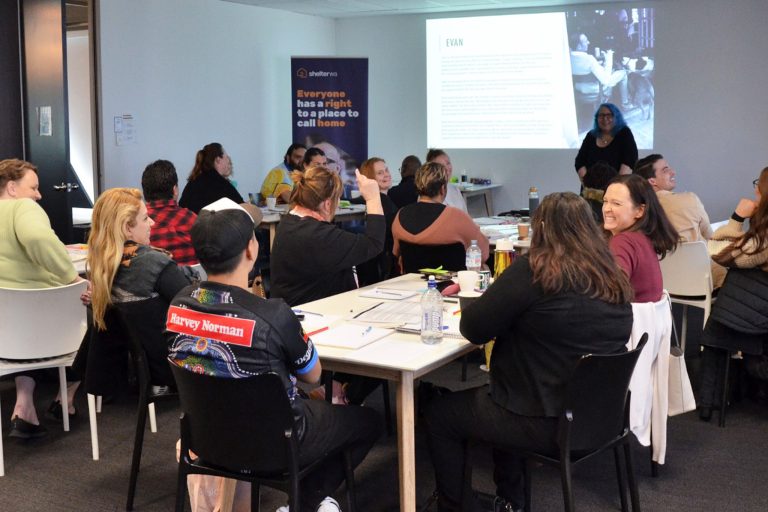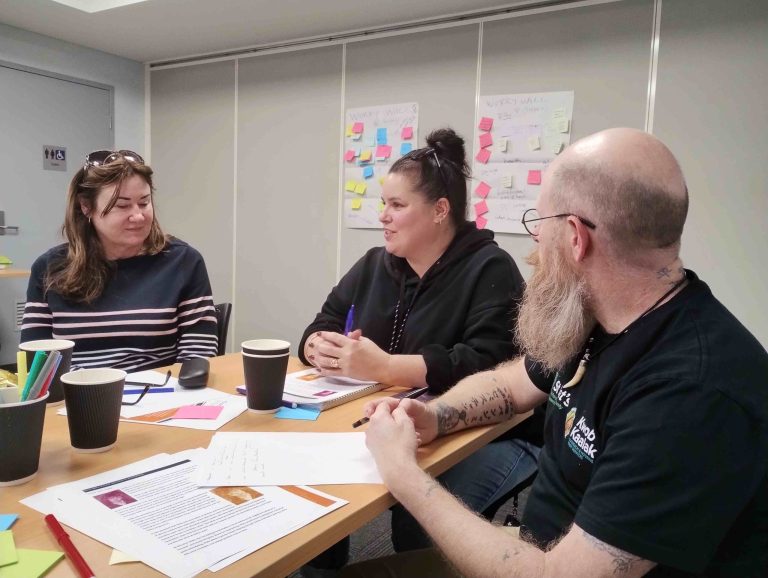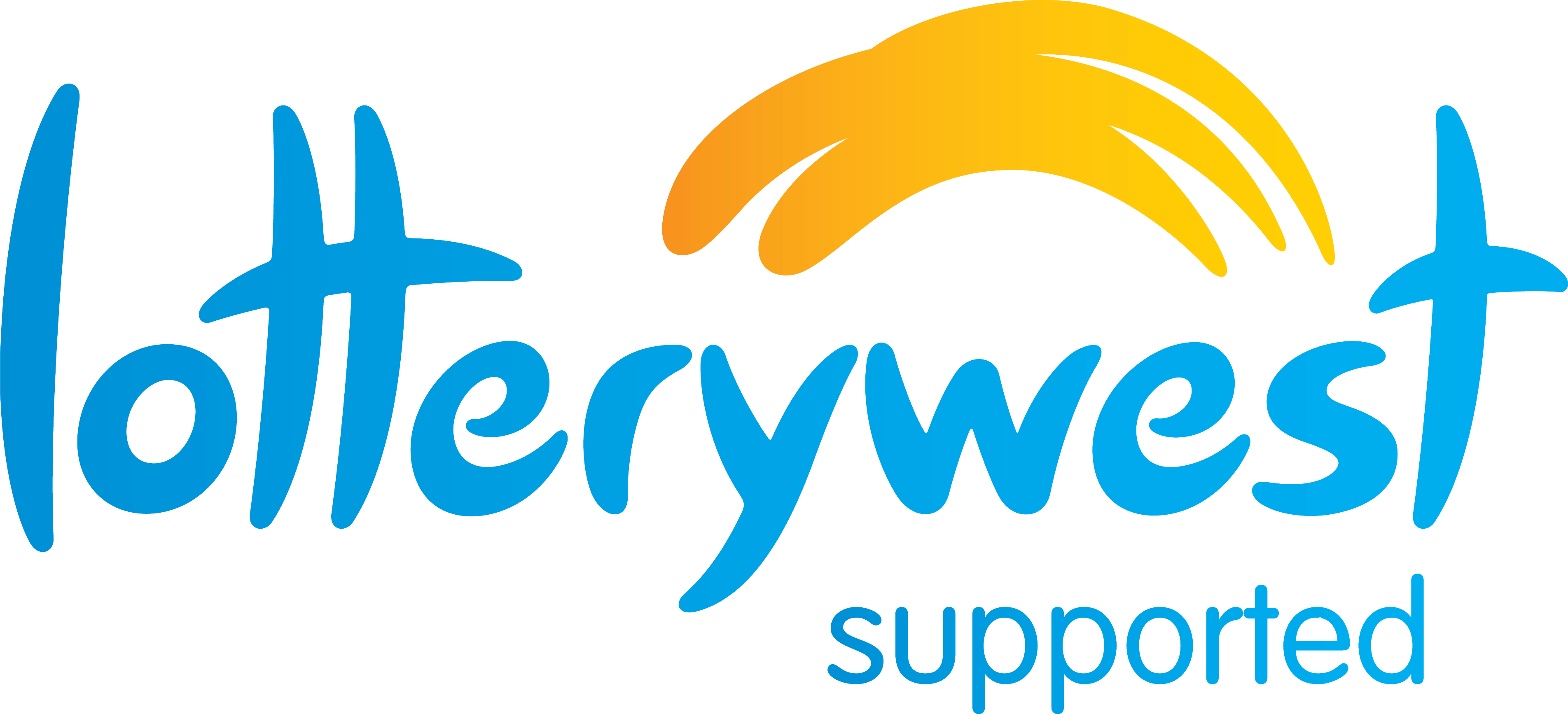[ad_1]
Shelter WA has put together this High-Level Overview of some of the housing and homelessness provisions in the WA 2020-21 Budget Papers.
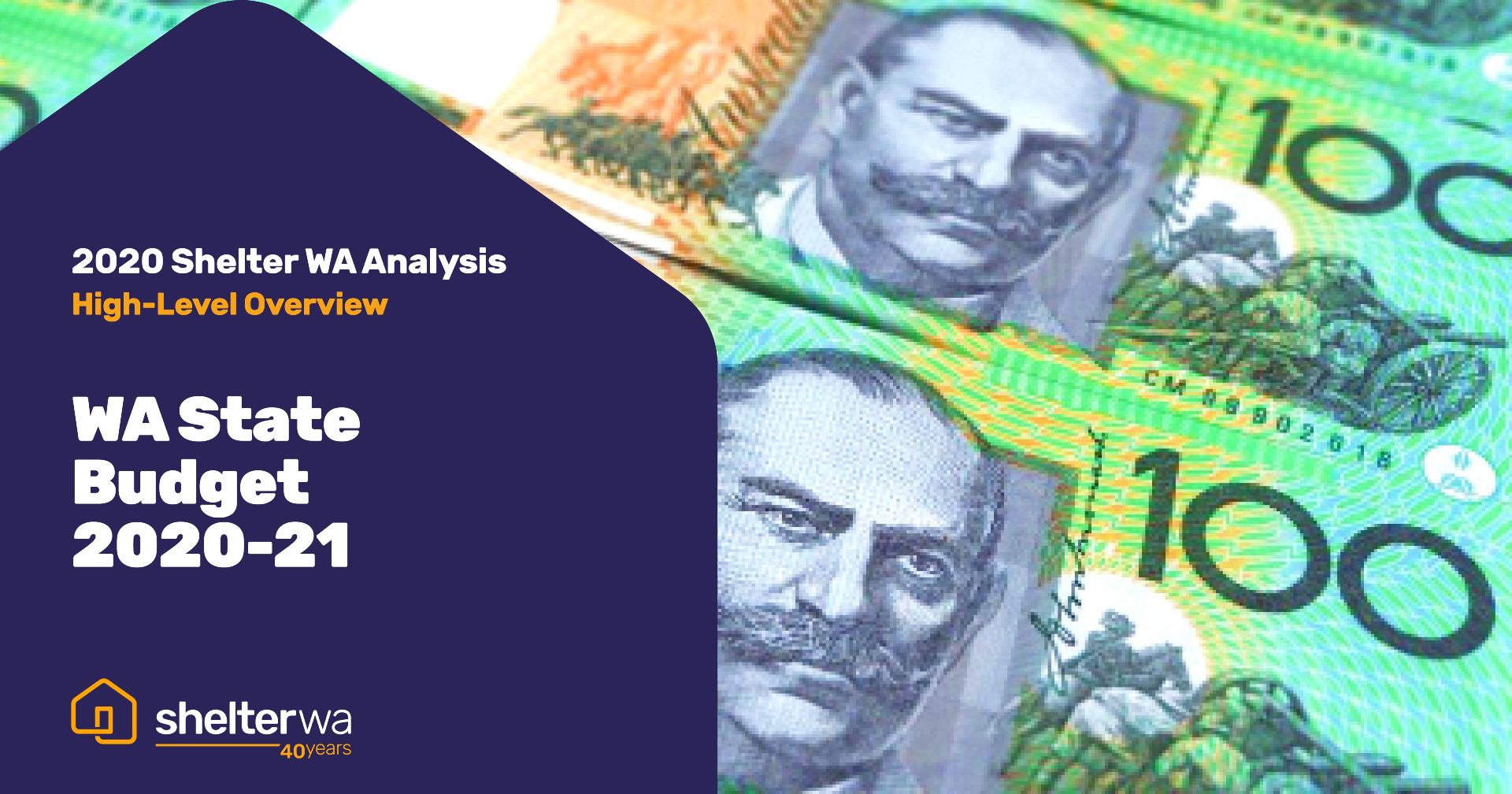
Context
- The Budget’s focus is Stronger, Safer Communities.
- Budget strategy has refocused from a shift in debt reduction to a focus on jobs supporting recovery and the community.
- Many initiatives are front ended across the forward estimates to drive the recovery effort.
- State Treasury are working to an assumption that WA’s hard border will remain in place until April 2021.
The State’s Financial Position
- $1.2 billion operating surplus for 2020-21, expected to drop to $363 million before rebounding over $1 billion in the following two financial years.
- Revenue revised down by $1.7 billion as a result of COVID-19 relief measures, lower taxation and GST-related grants.
- $6.6 billion wiped off the surpluses projected at the Mid-Year Review as a result of COVID-19.
- State Debt will rise by $8.3 billion from the Mid-Year Review over the forward estimates, with net debt projected at $25.58 billion this year. State Debt will rise to 14.1 per cent as a proportion of the State’s economy, up from 11.3 per cent in 2019-20.
The State’s Economic Fundamentals
- Gross State Product growth is forecast at 1.25 per cent for 2020-21, before improving to 2.75 per cent in 2021-22.
- State Final Demand is projected at 0.5 per cent in 2020-21, rising to 3.75 per cent next financial year before hovering between 2 per cent and 3 per cent for following years.
- State Treasury has WA’s population growth at 0.8 per cent over 2020-21, expected to decline before increasing to between 1 per cent and 1.3 per cent by 2023-24.
- Unemployment expected to decline from 8 per cent this financial year to 6 per cent by the end of the forward estimates in 2023-24.
- Recurrent expenditure is expected to be $4.9 billion higher than the mid-year review underpinned by an increase in COVID-19 related spending.
- The $5.5 billion State Recovery Plan is fully funded in the budget.
- The budget contains $27 billion worth of infrastructure projects, including $7.5 billion in regional WA – 43 per cent of this expenditure will be on road and rail infrastructure.
- A new Infrastructure Delivery Unit will be created within the Department of Finance at a cost of $9.7 million.
- Property taxation and charges revenue will decline over 2020-21, reflecting softer market conditions with increases to revenue are forecast over the forward estimates to 2023-24 – 2020-21 – $1.12 billion stamp duty revenue; $771 million land tax revenue: $18.6 million Foreign Buyer Surcharge Revenue.
Social and Affordable Housing
- 831 new social homes over 2020-21 to 2023-24.
- 75 per cent will be allocated to people on the priority wait list.
- Built to minimum Silver Liveable Homes standard.
Social Housing Economic Recovery Package (SHERP) (Pre-announced)
- Three streams totalling $319 million over two years.
- Stream One: $97 million to build or buy 250 dwellings – 2020-21 to 2022-23.
- Stream Two: $142 million housing refurbishment – 1,500 homes existing social housing and supported residential homes including the costs to relocate tenants over 2020-21 to 2021-22.
- Stream Three: $80 million for targeted maintenance for 3,800 regional social housing dwellings including remote Aboriginal communities and subsidised housing for regional government workers.
The majority of new housing will be made available to people on the social housing priority wait list. Where possible property refurbishments will improve liveability, sustainability and appropriateness for resident or tenant needs.
Housing Investment Package (Pre-announced)
- $150 million housing and homelessness package.
- $125 million for around 300 new public housing units targeting homelessness and vulnerable people on the priority wait list.
- $6 million to refurbish 20 and 50 metro public housing properties.
- $19.2 million for 200 additional shared equity homes in partnership with Keystart.
METRONET Social and Affordable Housing Job Package (Announced May 2018)
- $184 million over four years through the METRONET Social and Affordable Housing and Jobs Package.
- Build up to 320 new social housing dwellings and an additional 400 affordable homes and deliver a further 670 homes for full market price sale during the next five years.
- Up to 300 homes with universal design standards to assist Western Australians of every age and ability.
- Asset investment under this package has been reprofiled to reflect updates to delivery timeframes and project scope as a result of changes in housing market conditions with a downward revision of $6.8 million over 2019-20 to 2022-23.
Aboriginal Short-Stay Accommodation (Pre-announced)
- Geraldton – $20 million to accommodate up to 70 guests.
- Kununurra – $18 million to accommodate up to 75 guests.
- This is in addition to the Aboriginal Short-Stay Accommodation services in Derby, Broome and Kalgoorlie.
Housing First Initiatives (Pre-announced)
- 34.5 million over five years for a Housing First Homelessness Initiative which includes rental subsidies in Perth, Rockingham, Mandurah, Bunbury and Geraldton.
Two Common Ground Facilities (Pre-announced)
- $35 million over three years to plan, design and construct two Common Ground facilitates over three years.
- $2 million allocated in 2020/21, $20 million in 2022/23 and $13 million in 2023/24.
Residential Relief Grant Scheme (Pre-announced)
- $30 million available to landlords of private residential tenants who lost their jobs and faced financial hardship on or after 20 March 2020 due to the COVID-19 pandemic. The Scheme provides grants equivalent to four weeks rent up to a maximum of $2,000 paid directly to landlord who have provided rent relief to their tenants.
Remote Aboriginal Communities
- $201 million over 2020-21 to 2023-24 for the provision of essential services in remote Aboriginal communities following the Commonwealth’s decision to cease its historical ongoing funding support. The spending will deliver remote housing support and maintenance, essential municipal services, town-based accommodation, and remote swimming pools in communities.
North West Aboriginal Housing Fund
- $59.8 million over the forward estimates for initiatives under this fund.
Renewable energy technologies boost in WA recovery (Pre-announced)
- $6 million from the $66.3 million program for solar panels on around 500 social housing properties.
25.1 Million Youth Mental Health and Alcohol and Other Drug (Homelessness)
- $6 million from the $66.3 million program for solar panels on around 500 social housing properties.
Keystart (Pre-announced)
- Increased income limits ($15,000 for singles and couples and $20,000 for families) for home buyers taking out Keystart loans extended until June 2021.
Building Bonus Scheme (Pre-announced)
- $147 million for $20,000 Building Bonus grants to homebuyers to build new houses or purchase a new property in a single tier development prior to construction finishing.
Stamp Duty rebate for apartments (Pre-announced)
- $8.2 million to expand the 75 per cent off the plan transfer duty rebate, capped at $25,000 to include purchases in multi-tiered developments already under construction.
Regional Land Booster Package (Pre-announced)
- $116 million for the Regional Land Booster Package that will make residential, commercial, and industrial lots more affordable.
National Housing and Homelessness Agreement (NHHA)
- The estimated Commonwealth funding to Western Australia under NHHA over the forward estimates reflects the loss of the Federal Equal Remuneration Order (ERO) Supplementary Payment. The 2020-21 budget estimate under NHHA was $168.4 million. WA’s allocation in 2021-22 is estimated at $161.4 million.
HomeBuilder
- $70.6 million is the estimated Commonwealth funding to WA in 2020-21 under the HomeBuilder program which provides eligible owner-occupiers including first-home buyers with a grant of $25,000 to build a new home or substantially renovate an existing home.
Department of Communities
Services Summary – Housing
- Rental Housing Expenses – Estimated expense of $924 million in 2020-21 declining to $819 million in 2023-24.
- Home loans – $68 million estimated expense in 2020-21 increasing to $78 million in 2023-24.
Key Effectiveness Indicator
- Percentage of homelessness clients with some or all goals achieved at the completion of a homelessness services support period – 85 per cent.
- Responsiveness – total housing assistance provided relative to the public rental waiting list (bond loans) – Budget target 1.03 million.
- Waiting times for social housing accommodation:
- Average waiting time 2020-21 – 95 weeks.
- Median waiting time – 49 weeks.
Homelessness Support Services
- 2020-21 Budget Target – net cost of service $41 million.
- Employees – FTE 12.
- Average cost per homelessness support service client $3,800.
- Number of clients for the budget target is 17,300.
Rental Housing
- This includes public housing, community housing, rental housing for key workers in regional WA and Government Regional Officer Housing (GROH) and properties for remote communities.
- 2020-21 Budget Target – net cost of service $409 million.
- Employees – FTE 1,561.
- Average operating cost per rental property (excluding GROH) – $17,070.
Policy
- Restructure of the Housing Authority within the Department of Communities – Transfer of land development and related functions from the Department of Communities to DevelopmentWA. This restructure and resulting machinery of government change will require a realignment of financial transactions that is expected to impact on the State’s financial aggregates and will be reflected in the 2020-21 budget once the machinery of government change is complete.
- Establishment of the Housing and Homelessness Advisory Unit within the Department of Communities – intended to have Aboriginal cultural expertise and lived experience embedded into the unit and to set the strategic direction for this portfolio and improve stewardship.
General Comment
Whilst the social housing investment packages are very welcome, the State Budget has not adequately responded to the 14,000 people on the social housing wait list.
The State Government’s budget’s focus is on infrastructure investment. Social housing is critical social infrastructure that will drive economic and social recovery. The social housing investment packages are very welcome. Together they will deliver an additional new 831 social homes. Modelling by the University of NSW indicates that there is a shortfall of 39,200 social and 19,300 affordable homes across Western Australia to meet current need.
This State budget has not adequately responded to the needs of the 14,000 people on the social housing wait list or the estimated 9,000 people experiencing homelessness. Modelling estimates an additional 2,500 households are likely to apply for social housing if the unemployment rate increases to eight per cent. The average social housing wait time outlined in the budget will be 95 weeks. The Real Estate Institute of Western Australia (REIWA) have estimated that there are 52.2 per cent fewer properties available for rent compared to this time last year. Perth’s record-low vacancy rate means we are heading towards a rental crisis, and more social affordable rental options are needed to address this.
Western Australia need thousands not hundreds of new social homes, and budgets to maintain these homes to ensure the health, wellbeing and quality of life of tenants. There has been significant underinvestment over a number of years into the social housing system, including the sell–off of assets, which has led to a decline in the percentage of social housing stock. Housing stress is felt in metropolitan Perth and across regional Western Australia.
The State Government must harness the expertise of the Community Housing Sector who as professional property and tenancy management providers provide efficient and effective social and affordable housing services. Our State is missing out on harnessing new Commonwealth initiatives to build the social housing system by not leveraging State investment through the Community Housing sector.
Housing remains the single largest cost for households in Western Australia. Households on the lowest incomes are disproportionately impacted by the increasing cost of energy. We need more diverse homes that are designed for people of all abilities and cultural backgrounds and that are energy efficient. This will create new jobs and create vibrant and inclusive communities.
The government must be congratulated for the All Paths Lead to a Home: Western Australia’s 10-Year Strategy on Homelessness.
The government must be congratulated for the All Paths Lead to a Home: Western Australia’s 10-Year Strategy on Homelessness 2020–2030. Also for investment into two Common Ground facilities and new Housing First initiatives.
As a result of COVID-19, front line services have seen an increase in street present homelessness. With changes to JobSeeker and JobKeeper and the moratorium on evictions and rent increases ending homelessness and housing insecurity will increase. We urge the government to bring forward current investment in homelessness initiatives and couple this with new investment for immediate solutions for people who are sleeping rough. Housing First initiatives are needed across all of Western Australia. So too is, sustainable funding for homelessness services, so services can meet need. This is a very cost effective use of government funds. We know that housing stress, homelessness and the associated trauma leads to increased costs to health, mental health, police and corrections budget. Investment in upstream social and affordable housing and homelessness solutions are a sensible policy goal. They will create new jobs, drive economic and social recovery and deliver enduring value for our State.
Read the 2020-21 Budget Papers here.
About Shelter WA
Shelter WA brings together a strong coalition committed to diverse and affordable housing choice for all, with a particular focus on housing for people on very low to moderate incomes and groups that experience housing insecurity. Shelter WA undertakes research, engagement, policy development and strong advocacy to drive solutions to build an effective housing system and alleviate housing-related poverty. Our vision is that all people living in Western Australia have housing that enables them to thrive.
[ad_2]
Source link

